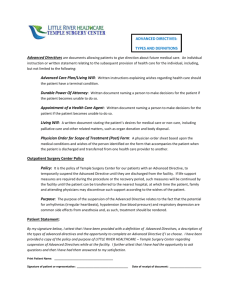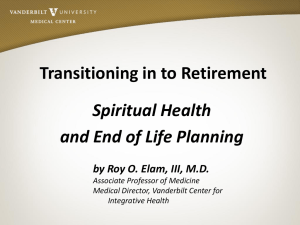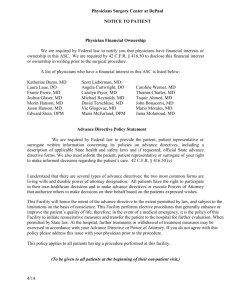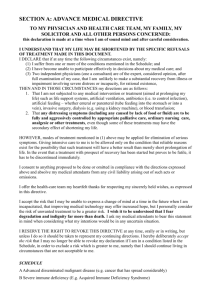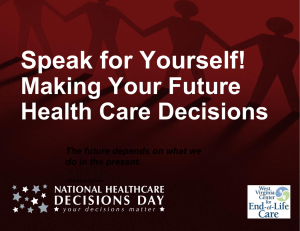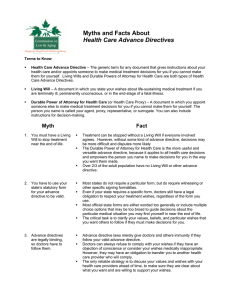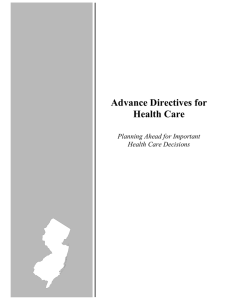Medical Advocacy and Advance Directives PowerPoint
advertisement
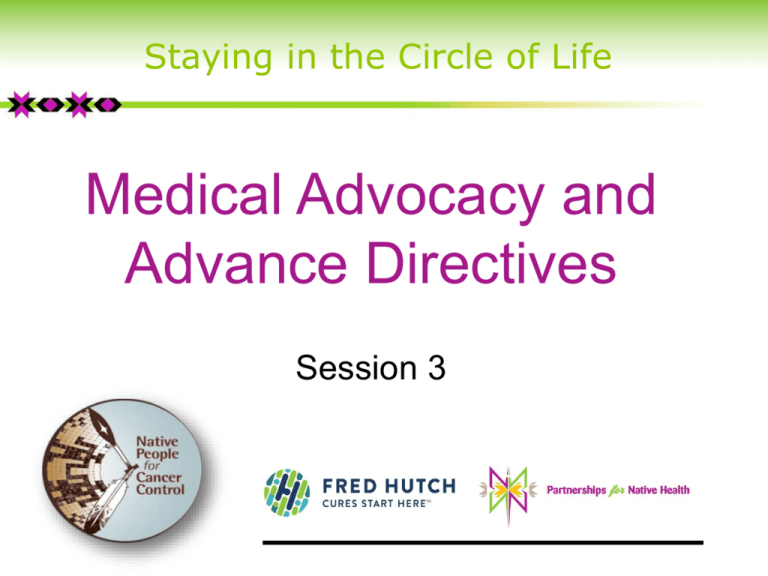
Staying in the Circle of Life Medical Advocacy and Advance Directives Session 3 Welcome Agreements We want to do what we can to make sure everyone feels comfortable while they’re here. Some examples: • Keep it confidential - everything anyone says stays in the room • Listen with respect • Stay on topic – we have a lot of information to go over and we want to make sure we cover it all • Other things we can do? What We Will Talk About Today • Understanding advocacy and why it’s important • Finding reliable health information • Learning how to get the most out of doctor visits • Learning about survivorship care plan and advance directives and why they’re important What Is Medical Advocacy? Medical advocacy involves – • Knowing as much as you can about your own health situation • Using that knowledge to exercise your right to receive high-quality healthcare Ways You Can Be Proactive • Find information from as many reliable sources as you can • Talk with your care team (doctors, nurses, community health workers) about what you’re learning • Ask your family, friends, and support network to help you solve problems • Incorporate traditional ways of wellness into your life Finding Reliable, Accurate Information • Who wrote the information? • When was the information written? • Who paid for the research and published the information? • Don’t rely on the Internet for information on diagnosis or treatment options!! How to get the most out of your appointment . . . • Make a list of questions, concerns, and positive progress to bring with you. • Ask as many questions as you want! • Make sure you leave your appointment with all of your questions addressed, and speak up if you don’t understand something. • Be assertive when necessary How to get the most out of your appointment . . . • If possible, bring a family member or community health worker with you to your appointment – they can help take notes! • If you can’t make your appointment, let your provider know right away, and reschedule right away. Talking With Your Doctors • Tell your doctor if a medication or other parts of your treatment are not working for you. • Tell your doctors that you are a cancer survivor. • It’s OK to ask for a second opinion. • If you are not getting along with your doctor, it’s OK to ask for a new doctor. • Thank your healthcare team for their time! Activity Role Play: Doctor Visit • Do you know what medications I am on now? • Do you have medical records that tell you about my cancer? • Does being a cancer survivor impact how often I see you? • I am feeling really tired. Does this have something to do with my cancer? • I am feeling a lot of stress. Can I talk to you about it? • Can I exercise as a cancer survivor? Survivorship Care Planning http://www.oncolink.org/oncolife/questions.cfm?app=0 Break What Is An Advance Directive? • An advance directive is a legal document that tells what kind of care people want to have when they can no longer express their own wishes. • Two common examples are: o Living Will o Medical Durable Power of Attorney (also called Healthcare Power of Attorney) • An advance directive can also include instructions about your healthcare decisions, such as donating an organ or tissue. Why are advance directives important? • You have the right to make decisions about your own health and treatment. • It’s important for family members and health care providers to know what kind of medical care someone wants at the end of life. When should you complete an advance directive? • Advance directives should be filled out while you’re healthy. • This gives you time to think about the end-oflife care you would choose if you were unable to communicate your wishes. • It also gives you time to discuss your wishes with your loved ones. http://www.cancer.gov/cancertopics/factsheet/Support/advance-directives Important Things to Know . . . The laws about advance directives vary from state to state, so it’s important to complete and sign an advance directive for the state where you live or where you expect to receive medical treatment. http://www.cancer.gov/cancertopics/factsheet/Support/advance-directives Example: Five Wishes Five Wishes is an advance directive that combines a living will and a healthcare power of attorney in addition to addressing matters of comfort and spirituality. http://www.rwjf.org/reports/grr/029110s.htm Five Wishes Wish 1: The Person I Want to Make Care Decisions for Me When I Can't Wish 5: What I Want My Loved Ones to Know Wish 4: How I Want People to Treat Me Wish 2: The Kind of Medical Treatment I Want or Don't Want Wish 3: How Comfortable I Want to Be Discussion Questions • How do you advocate for yourself? • Where do you go for health information? • Why might people want to exercise their right to make decisions about their own treatment? • What barriers can you see to completing an advance directive? Things to Think About • You can play an active role in getting the care you want at all stages of your life. • There’s a lot of information out there! Ask someone to help you find what is most reliable. • Advocate to ensure that you get the most out of your doctor visits. • Advance directives can help you plan how you want to be taken care of. They can be helpful for you and your family. Closing Circle
